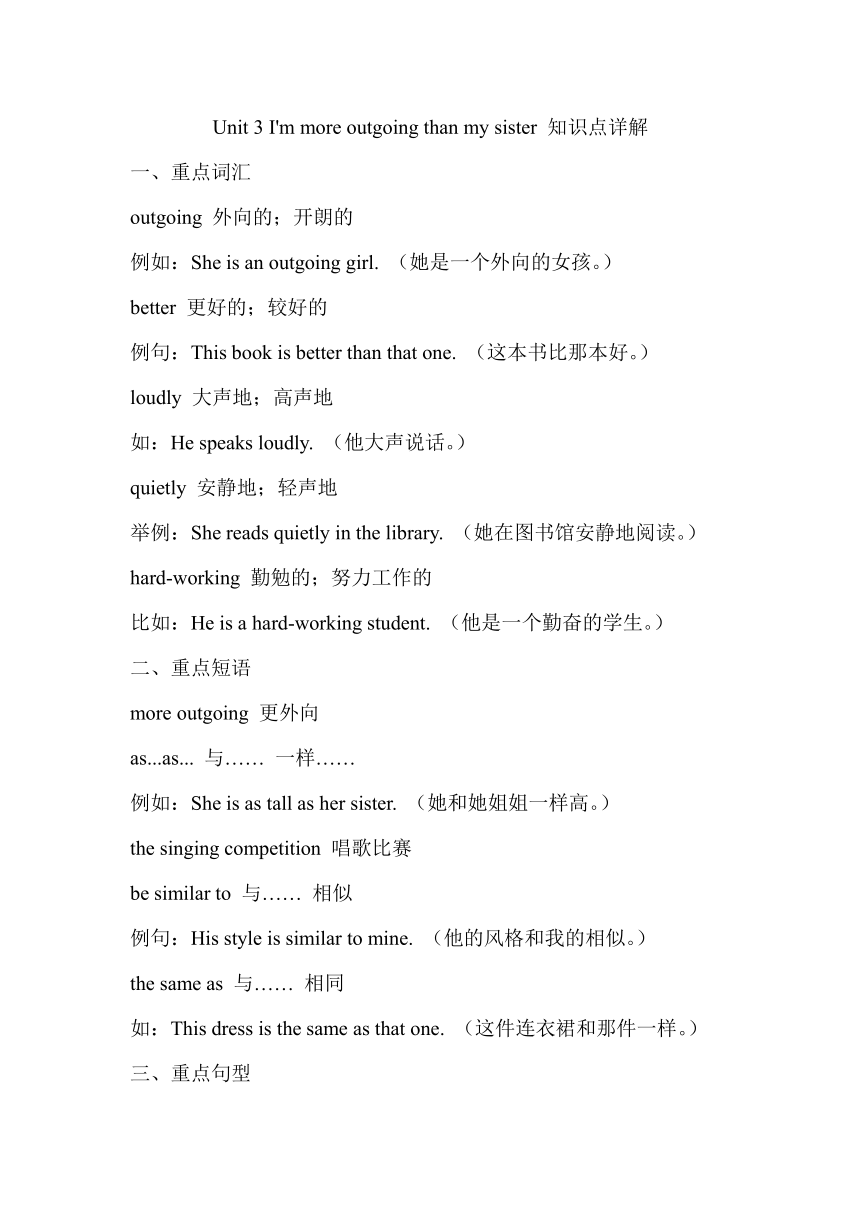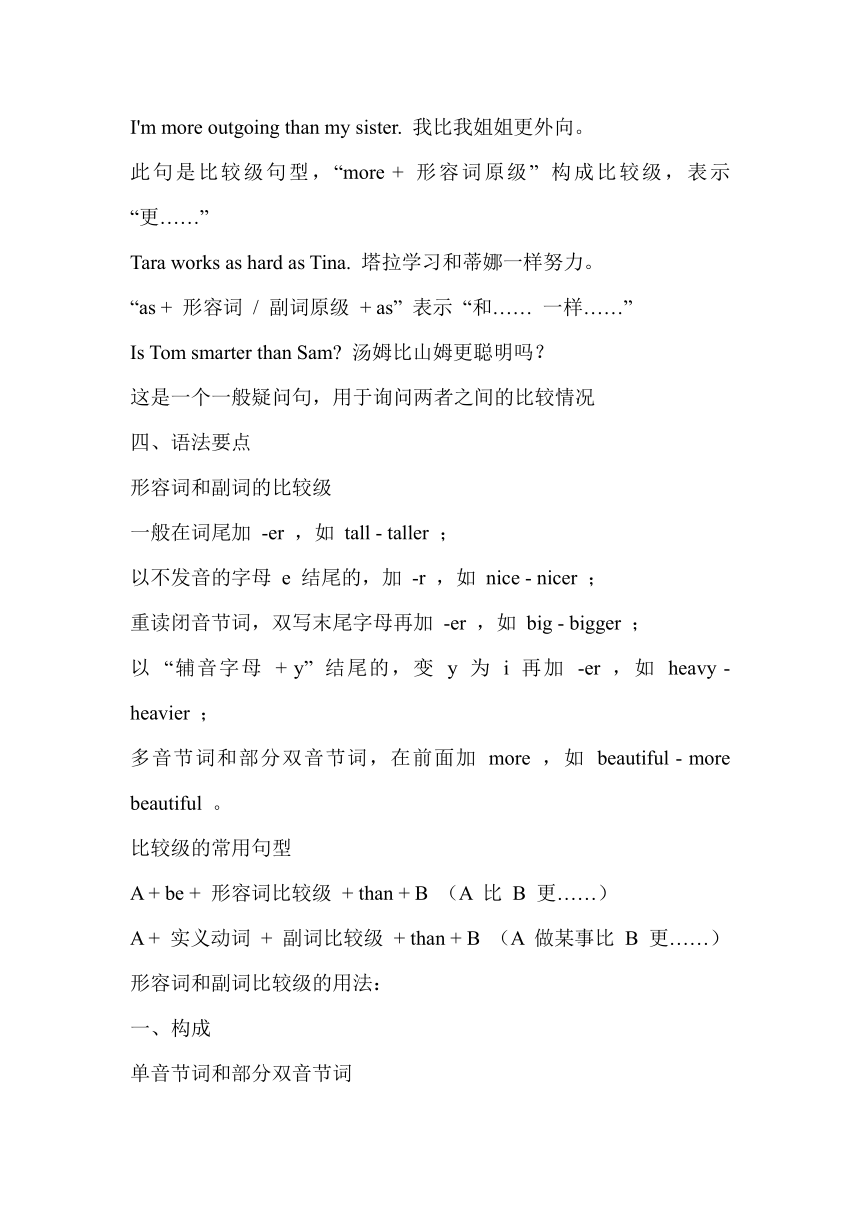Unit 3 I'm more outgoing than my sister 知识点详解 2024-2025学年人教版八年级英语上册
文档属性
| 名称 | Unit 3 I'm more outgoing than my sister 知识点详解 2024-2025学年人教版八年级英语上册 |  | |
| 格式 | docx | ||
| 文件大小 | 18.3KB | ||
| 资源类型 | 教案 | ||
| 版本资源 | 人教新目标(Go for it)版 | ||
| 科目 | 英语 | ||
| 更新时间 | 2024-08-17 10:07:35 | ||
图片预览


文档简介
Unit 3 I'm more outgoing than my sister 知识点详解
一、重点词汇
outgoing 外向的;开朗的
例如:She is an outgoing girl. (她是一个外向的女孩。)
better 更好的;较好的
例句:This book is better than that one. (这本书比那本好。)
loudly 大声地;高声地
如:He speaks loudly. (他大声说话。)
quietly 安静地;轻声地
举例:She reads quietly in the library. (她在图书馆安静地阅读。)
hard-working 勤勉的;努力工作的
比如:He is a hard-working student. (他是一个勤奋的学生。)
二、重点短语
more outgoing 更外向
as...as... 与…… 一样……
例如:She is as tall as her sister. (她和她姐姐一样高。)
the singing competition 唱歌比赛
be similar to 与…… 相似
例句:His style is similar to mine. (他的风格和我的相似。)
the same as 与…… 相同
如:This dress is the same as that one. (这件连衣裙和那件一样。)
三、重点句型
I'm more outgoing than my sister. 我比我姐姐更外向。
此句是比较级句型,“more + 形容词原级” 构成比较级,表示 “更……”
Tara works as hard as Tina. 塔拉学习和蒂娜一样努力。
“as + 形容词 / 副词原级 + as” 表示 “和…… 一样……”
Is Tom smarter than Sam 汤姆比山姆更聪明吗?
这是一个一般疑问句,用于询问两者之间的比较情况
四、语法要点
形容词和副词的比较级
一般在词尾加 -er ,如 tall - taller ;
以不发音的字母 e 结尾的,加 -r ,如 nice - nicer ;
重读闭音节词,双写末尾字母再加 -er ,如 big - bigger ;
以 “辅音字母 + y” 结尾的,变 y 为 i 再加 -er ,如 heavy - heavier ;
多音节词和部分双音节词,在前面加 more ,如 beautiful - more beautiful 。
比较级的常用句型
A + be + 形容词比较级 + than + B (A 比 B 更……)
A + 实义动词 + 副词比较级 + than + B (A 做某事比 B 更……)
形容词和副词比较级的用法:
一、构成
单音节词和部分双音节词
一般在词尾加 -er ,例如:tall - taller ,short - shorter 。
以不发音的字母 e 结尾的词,加 -r ,如:nice - nicer ,fine - finer 。
重读闭音节词,末尾只有一个辅音字母,应先双写这个辅音字母,再加 -er ,比如:big - bigger ,hot - hotter 。
以 “辅音字母 + y” 结尾的词,先把 y 变为 i ,再加 -er ,例如:heavy - heavier ,easy - easier 。
多音节词和部分双音节词
在词前加 more ,如:beautiful - more beautiful ,important - more important 。
二、用法
表示两者之间的比较
“A + be + 形容词比较级 + than + B”,意为 “A 比 B 更……”。例如:I'm taller than my brother. (我比我弟弟高。)
“A + 实义动词 + 副词比较级 + than + B”,意为 “A 做某事比 B 更……”。例如:He runs faster than me. (他跑得比我快。)
比较级前可用程度副词修饰
常见的程度副词有:much (…… 得多)、a little (一点儿)、even (甚至)、still (仍然)等。例如:
She is much more beautiful than her sister. (她比她姐姐漂亮得多。)
This book is a little more interesting than that one. (这本书比那本有趣一点儿。)
Tom is even taller than his father. (汤姆甚至比他父亲还高。)
“比较级 + and + 比较级” 表示 “越来越……”
例如:The weather is getting colder and colder. (天气变得越来越冷。)
“the + 比较级,the + 比较级” 表示 “越……,越……”
例如:The more you read, the more you know. (你读得越多,知道得就越多。)
比较级的特殊结构
“Which / Who + be + 比较级,A or B ” 用于在两者中选择。例如:Which is taller, Tom or Jack (汤姆和杰克,谁更高?)
“A + be + the + 比较级 + of the two...” 表示 “A 是两者中较…… 的”。例如:He is the taller of the two boys. (他是两个男孩中较高的那个。)
一、重点词汇
outgoing 外向的;开朗的
例如:She is an outgoing girl. (她是一个外向的女孩。)
better 更好的;较好的
例句:This book is better than that one. (这本书比那本好。)
loudly 大声地;高声地
如:He speaks loudly. (他大声说话。)
quietly 安静地;轻声地
举例:She reads quietly in the library. (她在图书馆安静地阅读。)
hard-working 勤勉的;努力工作的
比如:He is a hard-working student. (他是一个勤奋的学生。)
二、重点短语
more outgoing 更外向
as...as... 与…… 一样……
例如:She is as tall as her sister. (她和她姐姐一样高。)
the singing competition 唱歌比赛
be similar to 与…… 相似
例句:His style is similar to mine. (他的风格和我的相似。)
the same as 与…… 相同
如:This dress is the same as that one. (这件连衣裙和那件一样。)
三、重点句型
I'm more outgoing than my sister. 我比我姐姐更外向。
此句是比较级句型,“more + 形容词原级” 构成比较级,表示 “更……”
Tara works as hard as Tina. 塔拉学习和蒂娜一样努力。
“as + 形容词 / 副词原级 + as” 表示 “和…… 一样……”
Is Tom smarter than Sam 汤姆比山姆更聪明吗?
这是一个一般疑问句,用于询问两者之间的比较情况
四、语法要点
形容词和副词的比较级
一般在词尾加 -er ,如 tall - taller ;
以不发音的字母 e 结尾的,加 -r ,如 nice - nicer ;
重读闭音节词,双写末尾字母再加 -er ,如 big - bigger ;
以 “辅音字母 + y” 结尾的,变 y 为 i 再加 -er ,如 heavy - heavier ;
多音节词和部分双音节词,在前面加 more ,如 beautiful - more beautiful 。
比较级的常用句型
A + be + 形容词比较级 + than + B (A 比 B 更……)
A + 实义动词 + 副词比较级 + than + B (A 做某事比 B 更……)
形容词和副词比较级的用法:
一、构成
单音节词和部分双音节词
一般在词尾加 -er ,例如:tall - taller ,short - shorter 。
以不发音的字母 e 结尾的词,加 -r ,如:nice - nicer ,fine - finer 。
重读闭音节词,末尾只有一个辅音字母,应先双写这个辅音字母,再加 -er ,比如:big - bigger ,hot - hotter 。
以 “辅音字母 + y” 结尾的词,先把 y 变为 i ,再加 -er ,例如:heavy - heavier ,easy - easier 。
多音节词和部分双音节词
在词前加 more ,如:beautiful - more beautiful ,important - more important 。
二、用法
表示两者之间的比较
“A + be + 形容词比较级 + than + B”,意为 “A 比 B 更……”。例如:I'm taller than my brother. (我比我弟弟高。)
“A + 实义动词 + 副词比较级 + than + B”,意为 “A 做某事比 B 更……”。例如:He runs faster than me. (他跑得比我快。)
比较级前可用程度副词修饰
常见的程度副词有:much (…… 得多)、a little (一点儿)、even (甚至)、still (仍然)等。例如:
She is much more beautiful than her sister. (她比她姐姐漂亮得多。)
This book is a little more interesting than that one. (这本书比那本有趣一点儿。)
Tom is even taller than his father. (汤姆甚至比他父亲还高。)
“比较级 + and + 比较级” 表示 “越来越……”
例如:The weather is getting colder and colder. (天气变得越来越冷。)
“the + 比较级,the + 比较级” 表示 “越……,越……”
例如:The more you read, the more you know. (你读得越多,知道得就越多。)
比较级的特殊结构
“Which / Who + be + 比较级,A or B ” 用于在两者中选择。例如:Which is taller, Tom or Jack (汤姆和杰克,谁更高?)
“A + be + the + 比较级 + of the two...” 表示 “A 是两者中较…… 的”。例如:He is the taller of the two boys. (他是两个男孩中较高的那个。)
同课章节目录
- Unit 1 Where did you go on vacation?
- Section A
- Section B
- Unit 2 How often do you exercise?
- Section A
- Section B
- Unit 3 I'm more outgoing than my sister.
- Section A
- Section B
- Unit 4 What's the best movie theater?
- Section A
- Section B
- Unit 5 Do you want to watch a game show?
- Section A
- Section B
- Unit 6 I'm going to study computer science.
- Section A
- Section B
- Unit 7 Will people have robots?
- Section A
- Section B
- Unit 8 How do you make a banana milk shake?
- Section A
- Section B
- Unit 9 Can you come to my party?
- Section A
- Section B
- Unit 10 If you go to the party, you'll have a grea
- Section A
- Section B
